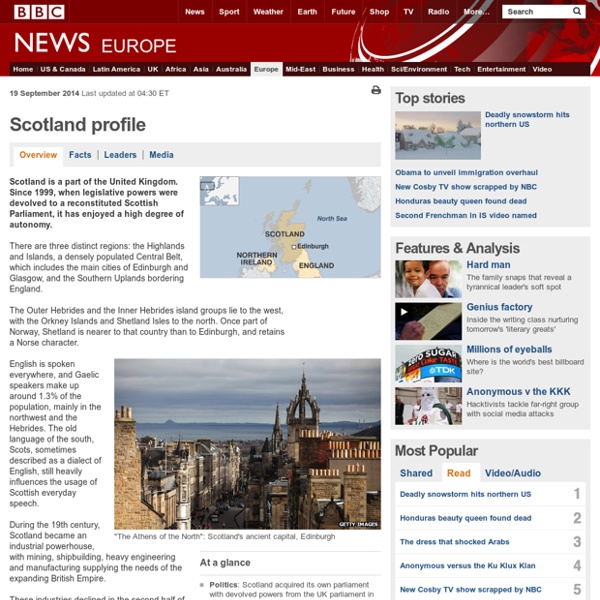



England profile - Overview 13 December 2012Last updated at 11:48 ET England is the largest constituent part of the United Kingdom, and accounts for 83 per cent of its population and most of its economic activity. Issues affecting the United Kingdom as a whole therefore also apply to England in particular, especially in the case of identity politics. England's continuing contribution to world civilisation is significant, ranging from language to sport, music and law. The various kingdoms set up by Germanic settlers in the 5th-6th centuries were finally united into the Kingdom of England between 927 and 954. The Norman Conquest of 1066 brought in a new ruling class from northern France and heavily influenced the language, culture and European orientation of the country. Oxford University is England's oldest university Continue reading the main story Politics: England has no governmental institutions separate from those of the UK. Country profiles compiled by BBC Monitoring Identity Culture Law
North Ireland profile - Overview 17 January 2013Last updated at 11:40 ET Northern Ireland, a part of the United Kingdom, is emerging from a period of conflict known as "the Troubles" and is attempting to implement an historic peace deal. Security has returned - though not without occasional reminders of the bad old days - and Northern Ireland has begun to reap the economic and social benefits. But divisions persist, finding physical form in the barriers that separate some communities. Preferences in schooling, sport and culture often follow ethnic and religious fault lines. Northern Ireland is made up of six counties and forms part of the province of Ulster. Giant murals became one of the main symbols of Northern Ireland's divisions Continue reading the main story Politics: Efforts to overcome the long conflict between pro-UK Unionists and pro-Ireland Nationalists has led to a devolved power-sharing government involving both sides. Profiles compiled by BBC Monitoring Religious and cultural traditions meld with politics.
Wales profile - Overview 15 January 2013Last updated at 06:19 ET Wales, a part of the United Kingdom, has retained its distinctive culture and has enjoyed a degree of autonomy since 1999. It includes a heavily industrialised south, a largely-Anglicised and prosperous farming east, and a Welsh-speaking, hill-farming North and West. Wales' devolved government - home rule - is now acquiring more powers and its economy is refocusing on light industry, tourism and financial services, but a small population and poor transport infrastructure continue to make development uneven. Welsh identity and the Welsh language have received a boost from an enlivened popular culture scene in the 1990s, and from the devolution of power from the central government in London to the Welsh National Assembly in Cardiff. Rugby is a national passion Continue reading the main story At a glance Country profiles compiled by BBC Monitoring Wales is a large peninsula in western Britain, divided from England by major rivers and mountain ranges.
United Kingdom country profile - Overview 12 November 2014Last updated at 07:38 ET The United Kingdom is made up of England, Wales, Scotland and Northern Ireland. It has a long history as a major player in international affairs and fulfils an important role in the EU, UN and Nato. The twentieth century saw Britain having to redefine its place in the world. Two world wars and the end of empire diminished its role, but the UK remains an economic and military power, with considerable political and cultural influence around the world. Britain was the world's first industrialised country. The Palace of Westminster is home to one of the world's oldest parliaments Continue reading the main story At a glance Politics: Prime Minister David Cameron, from the centre-right Conservative Party, heads a coalition with the UK's third party, the Liberal Democrats. Country profiles compiled by BBC Monitoring Special Report: United Kingdom Direct But this did not stop the centrifugal trend. Diversity There has also been a debate about immigration.
British Life and Culture Rituels de début de cours et activités orales Les rituels de début de cours constituent un moment d’échange et de pratique orale authentique de la langue en classe. Ils sont structurants, valorisants et rassurants. Ils permettent à tous les élèves de s’exprimer librement sans craindre l’évaluation. Dix minutes maximum seront consacrées le plus régulièrement possible à ces activités d’expression orale. Sans être longs, ces moments privilégiés du cours permettent de démarrer sur du positif. Ces activités d’expression orale seront menées par les élèves (effacement du professeur) en expression orale en continu, mais surtout, et dans la mesure du possible, en expression orale en interaction, afin de faire participer un maximum d’élèves lors de chaque séance. On pourra donner aux élèves en début d’année la liste des activités possibles. 1. a. Placer les élèves par deux en associant de préférence des élèves qui ne se connaissent pas bien. What’s your name ? How old are you ? Where and when were you born ? What is your favourite food ? b. c.